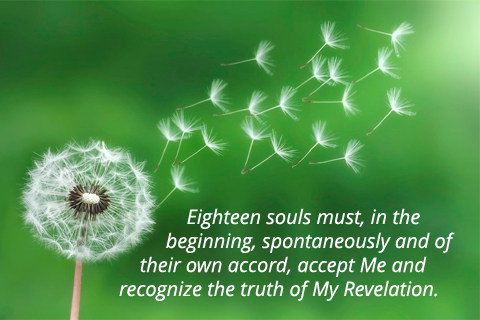 |
 |
|
PART THREE May 17, 2019 WHAT HATH GOD WROUGHT? [1] Sadness and inactivity had settled among the disciples of Siyyid Kázim following their leader’s death three weeks before. Everyone seemed lost and grieving. This is how Mullá Husayn, a fellow disciple, found them when he returned to the Shaykhí school in Karbilá in Iraq after visiting his home in Bushru’i, Persia. He tried to cheer them up and reminded them of the need to fulfill their mission as Shaykhís: to find the Promised One. He scolded them and told them it was their duty to arise and follow their departed leader’s wishes.  “Do you remember”, said Mullá Husayn, what our master told us before his death? “Yes,” replied a student. “Scatter far and wide, detach yourselves from all earthly things, humbly and prayerfully beseech your Lord to sustain and guide you. Never relax in your determination to seek and find Him who is your true Guide and Master, who will graciously aid you and enable you to recognize Him. Be firm until the day when He will choose you as the companions and the heroic supporters of the Promised One.” Despite this, they all declared that they accepted their own failure and his greatness. Therefore, if he were to declare himself to be the Promised One, they would all follow him. “God forbid!” cried Mullá Husayn, horrified. “Far be it from His glory that I, who am but dust, should be compared to Him who is the Lord of Lords! Had you truly listened to our master’s teachings, you would surely not have spoken such terrible words.” One by one, however, the students all gave excuses as to why they should remain in Karbilá. Realizing their despondence, Mullá Husayn turned away and, along with his brother and nephew, left to fulfill the important mission that Siyyid Kázim had entrusted to his students. On their way to Najaf, they stopped at a mosque in the town of Kufah, where they performed 40 days of fasting and prayer in preparation for their sacred mission. They were soon joined by thirteen Shaykhí companions who had finally decided to embark on the quest as well. Mullá Husayn, his brother and nephew moved on to Búshihr, where Mullá Husayn’s soul began to vibrate from the traces of his Beloved’s presence. He and his companions were then drawn as by a magnet northward to the city of Shíraz. When they arrived there a few hours before sunset, Mullá Husayn sent his companions to find accommodations and promised to meet them later for evening prayers. As he was walking just beyond the city walls, Mullá Husayn suddenly saw a young man with a luminous face and wearing a green turban approach him. This stranger greeted him with much love, embraced him and invited him to his home. Mullá Husayn, surprised, begged to be excused because his companions had found lodging and were waiting for him. “Commit them to the care of God,” replied the young man. “He will surely protect them.” He then asked Mullá Husayn to follow him. Stunned by this encounter, Mullá Husayn felt compelled to follow this mysterious man to his modest home. When they arrived, Mubárak, the young man’s Ethiopian servant, opened the door. “Enter therein, in peace,” said Siyyid ‘Alí-Muhammad. As he followed Siyyid ‘Alí-Muhammad up the stairs to his chambers, an indescribable feeling of joy flooded his soul. Could this man help him in finding the object of his quest? With peerless courtesy, Siyyid ‘Alí-Muhammad ordered water and a towel so that he could wash the dust of travel from his hands and feet. Tea was then served, but soon Mullá Husayn arose and asked to be excused, stating that his brother and nephew were waiting for him. “You surely have made the hour of your return conditional upon the will and pleasure of God. It seems that His will has decreed otherwise. You need have no fear of having broken your promise,” said his host. [1] Samuel F. Morse
sent the very first telegraph message in the U.S. on May 24, 1844,
using the biblical quote “What Hath God Wrought?” (Numbers 23: 23).
This quote was chosen by a woman named Annie Ellsworth. |
|
|